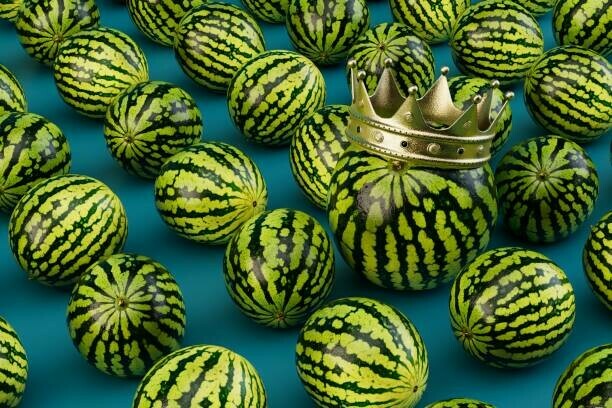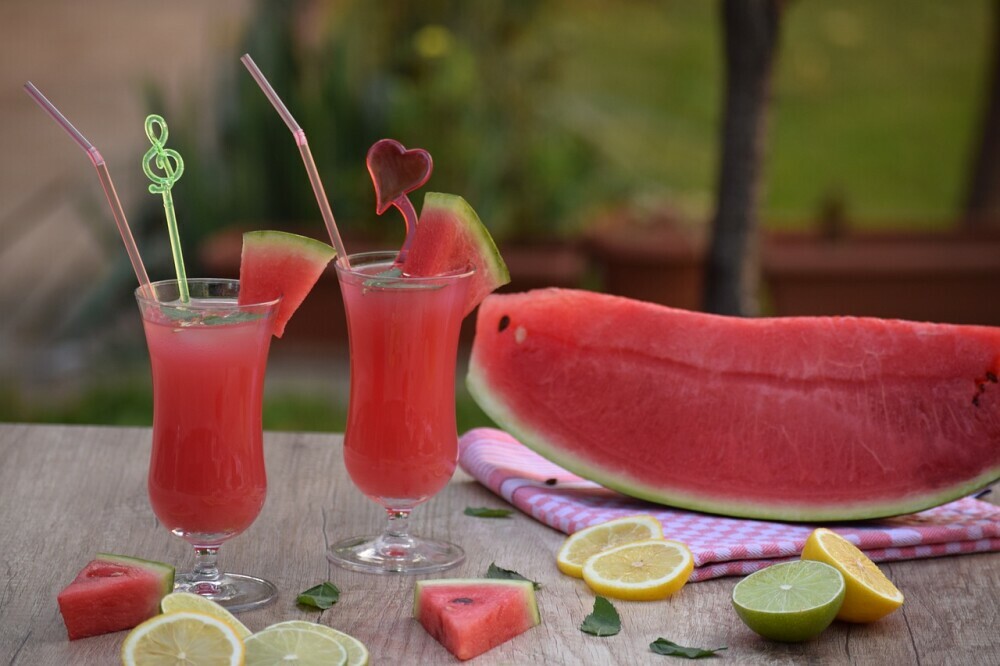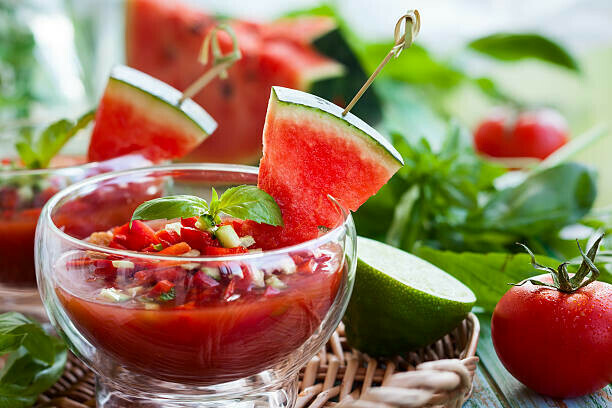Today, I’d like to talk to you about “Lycopene In Watermelon” as a great source of nutrients for your eye health. Lycopene is a red pigment in the carotenoid family. You’ll find it in many fruits and veggies, which boosts your health. It does more than color food as it helps your body too. Lycopene influences your system by working as a strong antioxidant, due to its special structure that fights free radicals. Its power to stop oxidative stress has caught the eye of scientists and diet experts. They’re looking into how it might boost heart health, improve skin looks, and keep cells working well.
Watermelon stands at the top of natural lycopene sources. People eat this fruit to cool down and satisfy their thirst. Yet watermelon provides more than its juicy feel and sweet flavor. It contains plenty of lycopene, which has caught people’s interest. This has transformed how folks see this summer fruit. It’s not just a tasty snack now. They look at it as a natural method to increase their antioxidant intake. The high amount of lycopene in watermelon makes it a smart pick for those who want to improve their health through their diet.
Lycopene has an impact on human health that extends beyond fighting free radicals. Studies show that eating foods rich in lycopene can reduce your chances of getting long-term health risks like heart disease and some types of cancer. This makes it essential to add to a well-rounded diet to avoid sickness. It also helps to keep eyes in good shape by protecting them from harm caused by light and toxic stuff in the environment through its ability to fight off damaging molecules.

Eating watermelon and other natural foods rich in lycopene offers an easy and tasty way to get your share of this helpful compound. The mix of lycopene and other nutrients in these fruits has an influence on your overall health. You can eat watermelon by itself, mix it into smoothies, or add it to different recipes. This makes watermelon a flexible and healthy choice to increase your lycopene intake.
The Nutritional Powerhouse: Watermelon

Watermelon reminds us of scorching summer days, but it does more than quench your thirst—it has a lot of key vitamins, minerals, and antioxidants. This vibrant fruit contains water, which makes it refreshing and helps you stay hydrated. Beneath its sweet juicy flesh, you’ll discover plenty of nutrients that make watermelon a great addition to any healthy diet. It’s packed with vitamin C, vitamin A, and potassium, so watermelon helps many body functions, like boosting your immune system to keep your skin in good shape, and aiding your muscles to recover. What’s more, it’s low in calories, so you can eat it without worry if you’re keeping an eye on what you eat.
Watermelon fits into a balanced diet in many ways. You can eat it fresh, mix it into smoothies, or create unique salads with it as the main ingredient. This fruit brings taste and nutrients to your meals. Its natural sweetness leads many people to pick it as a way to reduce sugar while still enjoying something sweet. Because it contains a lot of water, watermelon also helps you feel satisfied without overeating making it a solid option for those trying to manage their weight.
Watermelon shines in summer when it’s fresh and tastes best. This makes it popular in hot weather and enhances its natural flavor and nutrients. But new farming techniques now let people find watermelon year-round in many areas, so they can enjoy its benefits anytime. It pairs well with many ingredients, from herbs and spices to cheeses and other fruits making it both savory and sweet.

When you compare watermelon to other foods high in lycopene like tomatoes and pink grapefruit, it stands out due to its lycopene content. Most people think of tomatoes first for lycopene in their diet, but watermelon contains more per serving. This helps to increase your antioxidants. Plus, its natural sweetness makes it more enjoyable for many people. So if you aim to better your overall diet or just increase your lycopene intake, watermelon offers a yummy and healthy option to add to your meals.
Lycopene and Eye Health: A Natural Remedy

Lycopene, a strong antioxidant in many red and pink fruits, has become a natural friend to keep and boost eye health. It has a special power to wipe out free radicals in the body, which helps protect sensitive eye tissues from damage by oxidation. This matters a lot because eyes always face light and stress from the world around them making them easy targets for harmful oxidative stress. Lycopene’s antioxidant features work by hunting down these free radicals. If left alone, these free radicals could break down eye cells and over time lead to risks like cataracts and age-related macular degeneration (AMD).
A number of scientific studies have shown that lycopene has an influence on keeping and even bringing back eyesight. Research points out that people who eat more lycopene are less likely to get serious eye problems ones that come with getting older. A study looked at patients who were starting to show signs of AMD. It found that eating lots of lycopene not slowed down the disease but also made their overall vision better. These results stress how important it is to add lycopene to your diet to keep your eyes healthy in the long run.
When you compare lycopene to other natural eye health remedies like lutein and zeaxanthin, you’ll see it has some unique advantages. Lutein and zeaxanthin shield eyes from harmful blue light. Lycopene, on the other hand, has a stronger effect on fighting oxidative stress throughout the eye. This means lycopene works well with other antioxidants to protect against many eye problems. What’s more, you can add lycopene to your daily meals. It’s found in tasty foods such as watermelon, tomatoes, and pink grapefruit. This assists you in getting a wide range of nutrients to keep your eyes healthy.

To get the most out of lycopene, experts say you should eat 6 to 15 milligrams every day. You can get this amount by eating lots of fruits and veggies that have lycopene. If you keep adding lycopene to your meals, it will build up over time. This can help protect your eyes from strain lower your chances of getting eye problems as you age, and might even make your vision better. By making easy changes to what you eat, like eating more tomatoes or watermelon, you can take care of your eyes and keep your vision strong for a long time.
Integrating Watermelon into Your Diet for Eye Health

Watermelon is a cool and adaptable fruit you can add to your diet. It doesn’t just keep you hydrated – it also gives your eyes important nutrients. Watermelon has a lot of lycopene, so it’s a tasty way to get more antioxidants that protect your eyes from damage. You can enjoy watermelon in lots of simple and creative ways without getting tired of how it tastes. Whether you put it in salads or blend it into smoothies, adding watermelon to your meals can be fun and good for you.
One way to eat more watermelon is to cut it into cubes and keep it cold in the fridge to snack on. You can also mix it in a blender to make a cool juice or smoothie adding other fruits like strawberries or some mint to make it taste fresh. To try something different, you can chop up watermelon and put it in a summer salad with arugula, feta cheese, and a little balsamic vinegar. This mix doesn’t just taste great, it also helps you get more lycopene and other nutrients that are good for your eyes.
Watermelon can spice up your everyday meals. Mix watermelon pieces with yogurt and granola for breakfast to kick off your day with a filling and nutritious meal. If you want to try something new, throw watermelon slices on the grill and add a pinch of sea salt and chili powder to make a one-of-a-kind side dish that goes well with any cookout. For dessert, stick watermelon cubes in the freezer and eat them as a wholesome stand-in for popsicles or whip them into a sorbet.

You can find lots of recipes that are packed with lycopene and nutrients good for your eyes. On hot days, watermelon gazpacho hits the spot. It mixes watermelon, cucumber, tomatoes, and lime to create a dish full of vitamins A and C. Another tasty option is watermelon salsa. You can combine it with chopped red onion, cilantro, and jalapeño to make a dip that’s both sweet and spicy.
When picking out a watermelon, try to find one that seems heavy compared to its size and has a yellowish spot where it rested on the ground while ripening. To keep it fresh, store a whole watermelon at room temperature, but after cutting, put the pieces in the fridge in a sealed container to preserve their freshness. Adding watermelon to your regular diet not pleases your taste buds but also provides a helpful nutrient boost for your eyes.
Real-Life Testimonials and Future Research

Lycopene has caused a revolution in eye health for many people who have seen clear improvements. Think about someone who had fought with age-related macular degeneration (AMD) for years watching their vision get worse. They started eating more foods rich in lycopene like tomatoes and watermelon every day. Soon after, they saw better and had fewer problems with their eyes. This matches what lots of other people say – adding lycopene to what they eat has helped their eyes stay healthy. It’s amazing to see how just changing your diet a bit can make such a big difference to something as important as being able to see well.
Success stories from real people boost self-assurance, and ongoing research into lycopene’s effects on eye health shows promise. Researchers are now looking at how lycopene might stop or slow down major eye problems like cataracts and AMD. Early findings hint that lycopene’s antioxidants can guard eyes against oxidative stress, a key factor in these conditions. Scientists are also digging into lycopene’s long-term perks checking out its ability to keep vision sharp as we get older. These studies paint an encouraging picture of lycopene’s role in eye health, with more in-depth results expected in the years ahead.

Health and eye experts keep praising lycopene for how it helps health. Top nutritionists point out that lycopene protects eyes, heart, and skin. Its ability to boost overall health has made many professionals love this nutrient. Eye doctors feel excited about how it might slow down eye aging. They say that while lycopene isn’t a magic fix, eating it as part of a good diet can pay off in the long run.
If you want to boost your eye health, looking into lycopene’s advantages is a good starting point. Just remember, it’s wise to talk to a doctor before you change your diet a lot or start taking new supplements. Everyone’s health needs are different, and a doctor can give you personal advice on how to add lycopene to your meals. This balanced approach will help you get the most from lycopene while keeping your overall health in check for years to come.
Thank you for reading my article about “Lycopene In Watermelon” and I would love to receive your comments down below, in case of any.

